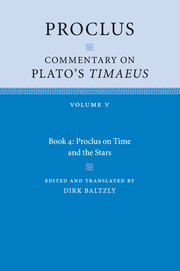IV - The Traditional Gods
Published online by Cambridge University Press: 30 June 2022
Summary
Sub-lunary gods and daemons, Tim. 40d6–7
To speak about the other daemons and to know their genesis is a task greater than ourselves. (Tim. 40d6–7)
How these beings are known
Since he intends to pursue an account concerned with the sub-lunary gods, he says that this is remarkable and a task greater than ourselves, perhaps in as much as these matters go beyond tradition that belongs to us, should we propose both to discover their genesis and to show it to others. After all, what he said earlier about the Demiurge – that it is ‘quite a task both to find him and to declare him to all’ (28c3–5) – surely applies now to [speaking] about the sub-lunary gods: that to know their genesis and to speak [about them] is a task greater than ourselves.
What, then, does the manner of this indication that is used by him mean? After all, since he has given accounts that are numerous and remarkable about the entire heaven and about the intelligible Paradigm, how can he say that the account that dealswith the generation-producing (genesiourgos) gods is a task too great for him? Or perhaps it is possible [for him] to say these things because these [generation-producing gods] were thought by many among the physiologists to be soul-less things that are just randomly carried along, without exercising providential care, i.e. the elements. While agreeing that the things in the heavens participate in intellect and the gods due to the order among them, they abandoned the realm of Becoming as something subject to great change, indefinite and without providential care – things of the kind that Aristotle too subsequently believed them to be, since he established unmoved causes only for the celestial revolutions (whether there were eight or more) but abandoned these elements [down here] to be soul-less. Lest we should be afflicted with the same [errors] as these people, Plato right at the beginning celebrated and announced the generation of the sub-lunary gods as divine and intellectual, there being no need whatsoever of any such [corresponding] indication in the case of the celestial gods.
- Type
- Chapter
- Information
- Proclus: Commentary on Plato's Timaeus Volume 5: Book 4: Proclus on Time and the Stars , pp. 257 - 268Publisher: Cambridge University PressPrint publication year: 2013



